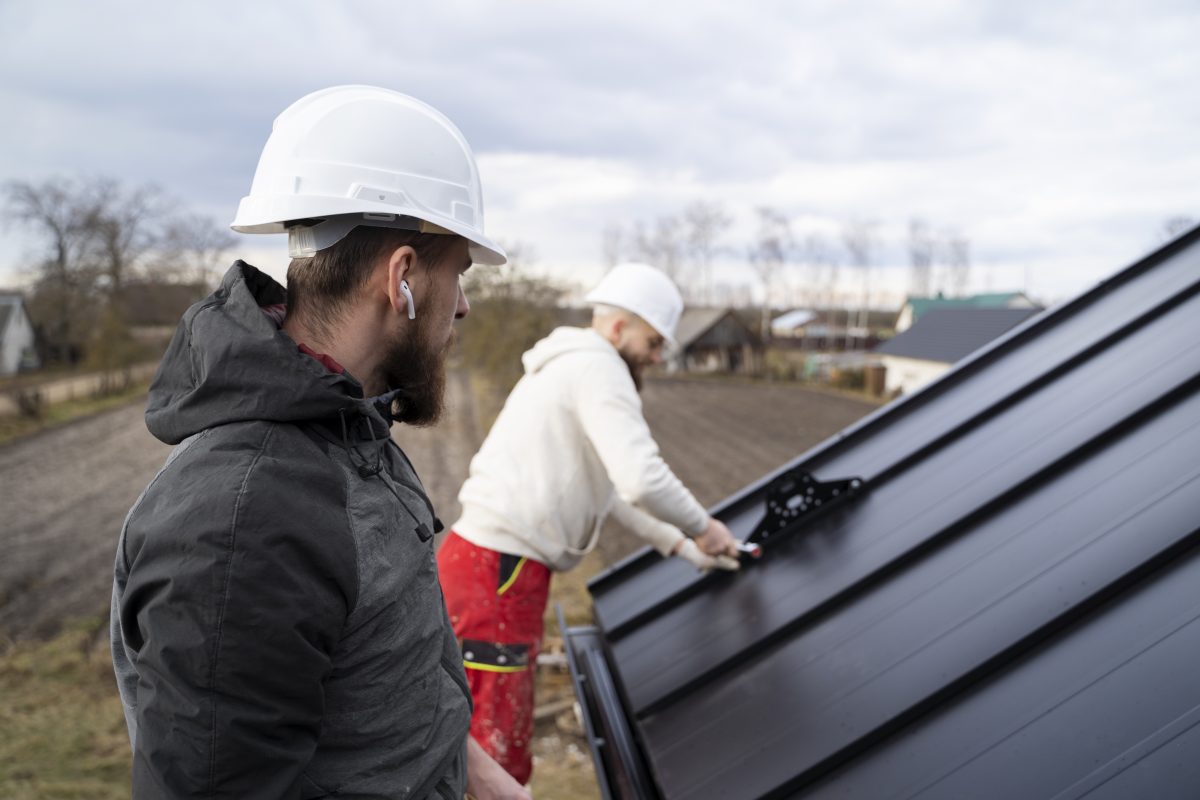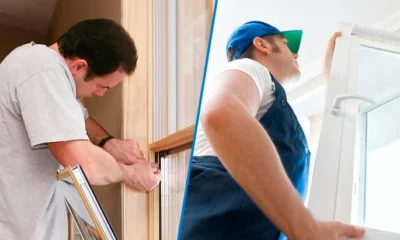HOME IMPROVEMENT
Commercial Roofing Contractors: Your Ultimate Guide

Choosing the right commercial roofing contractor is crucial for the longevity and safety of your building. This guide will provide you with detailed insights into the world of commercial roofing, helping you make informed decisions whether you’re installing a new roof, conducting maintenance, or handling repairs.
Understanding Commercial Roofing
Definition and Scope
Commercial roofing involves installing, maintaining, and repairing roofs on commercial buildings such as offices, warehouses, and retail stores. Unlike residential roofing, which often uses shingles and simple structures, commercial roofing typically deals with larger, more complex systems and materials.
Differences Between Residential and Commercial Roofing
Residential and commercial roofing differ in several key areas:
- Materials: Commercial roofs often use more durable and heat-resistant materials like metal or TPO.
- Design: Commercial roofs are usually flat or have a low slope, while residential roofs are often steeply pitched.
- Size: Commercial roofs cover larger areas and require more extensive installation and maintenance processes.
Importance of Hiring Professional Contractors
Expertise and Experience
Professional commercial roofing contractors bring a wealth of expertise and experience to the table. They are well-versed in the latest industry standards and technologies, ensuring that your roof is installed or repaired correctly the first time.
Legal Compliance and Safety
Hiring licensed contractors ensures compliance with local building codes and safety regulations. Professional contractors are trained to handle hazardous materials and work safely at heights, reducing the risk of accidents and legal issues.
Types of Commercial Roofing Systems
Flat Roofs
Flat roofs are a common choice for commercial buildings due to their cost-effectiveness and ease of installation. They provide a practical space for HVAC units and other equipment.
Metal Roofs
Metal roofing is known for its durability and longevity. It’s resistant to extreme weather conditions and requires minimal maintenance, making it a cost-effective option over time.
Green Roofs
Green roofs are becoming increasingly popular due to their environmental benefits. They involve a layer of vegetation planted over a waterproof membrane, which can improve insulation and reduce stormwater runoff.
Shingle Roofs
While less common in commercial settings, shingle roofs can be used on smaller buildings or extensions. They are relatively easy to install and repair but may not offer the same durability as other materials.
Built-Up Roofing (BUR)
BUR systems are made up of multiple layers of bitumen and reinforcing fabrics, creating a durable and waterproof surface. They are ideal for flat or low-slope roofs and provide excellent insulation.
Selecting the Right Roofing Contractor
Credentials to Look For
When choosing a commercial roofing contractor, consider the following credentials:
- Licensing: Ensure they are licensed to operate in your area.
- Insurance: Verify they carry adequate liability and workers’ compensation insurance.
- Certifications: Look for certifications from reputable industry organizations.
Questions to Ask
To gauge a contractor’s reliability and expertise, ask these questions:
- How long have you been in business?
- Can you provide references from similar projects?
- What is your process for handling unforeseen issues?
Checking References and Reviews
Always check references and read online reviews to get a sense of the contractor’s reputation. Speak directly with previous clients to learn about their experiences and satisfaction levels.
Cost Considerations
Factors Affecting Cost
Several factors influence the cost of a commercial roofing project, including:
- Roof Size: Larger roofs require more materials and labor.
- Material Choice: High-quality materials may have a higher upfront cost but offer better durability.
- Complexity of Installation: Complex designs and structures can increase labor costs.
Budgeting for Roofing Projects
Create a detailed budget that accounts for all potential expenses, including materials, labor, permits, and unforeseen repairs. Always set aside a contingency fund for unexpected issues.
Licensing and Insurance
Importance of Proper Licensing
Proper licensing ensures that the contractor adheres to local regulations and standards. It also protects you from potential legal issues and ensures the work meets building codes.
Understanding Insurance Coverage
Verify that your contractor carries adequate insurance coverage, including:
- Liability Insurance: Covers property damage and injuries that occur during the project.
- Workers’ Compensation: Provides financial protection if a worker is injured on your property.
Materials Used in Commercial Roofing
Common Roofing Materials
Commercial roofs can be made from a variety of materials, each with its benefits:
- TPO: A popular single-ply membrane known for its durability and energy efficiency.
- EPDM: Another single-ply membrane that offers excellent weather resistance and flexibility.
- PVC: A durable and long-lasting option often used in industrial settings.
Eco-Friendly Options
Eco-friendly roofing materials are gaining traction due to their environmental benefits:
- Recycled Materials: Some roofing systems use recycled content, reducing waste and resource consumption.
- Cool Roofs: These roofs reflect more sunlight and absorb less heat, improving energy efficiency.
Roof Installation Process
Initial Assessment
A thorough initial assessment is crucial for determining the best roofing solution. This includes inspecting the current roof, understanding the building’s requirements, and identifying potential challenges.
Material Selection
Choose the appropriate materials based on the building’s needs, climate conditions, and budget. Consider factors such as durability, maintenance requirements, and energy efficiency.
Installation Steps
The installation process typically involves:
- Preparing the Site: Clearing debris and ensuring the surface is ready for the new roof.
- Laying the Base Layer: Installing a waterproof membrane to protect against leaks.
- Installing the Roofing Material: Applying the chosen roofing material, ensuring proper alignment and secure attachment.
Maintenance and Inspection
Regular Maintenance Tips
Regular maintenance is essential for prolonging the life of your commercial roof. This includes:
- Cleaning Gutters and Drains: Preventing water buildup and leaks.
- Removing Debris: Avoiding damage from accumulated debris.
- Checking Seals and Joints: Ensuring they remain watertight.
Importance of Inspections
Routine inspections help identify and address potential issues before they become major problems. Schedule inspections at least twice a year and after severe weather events.
Seasonal Considerations
Different seasons pose unique challenges for commercial roofs:
- Winter: Snow and ice can cause damage and leaks.
- Summer: UV rays and heat can degrade roofing materials.
- Spring/Fall: Heavy rains and winds can test the roof’s integrity.
Common Roofing Issues and Solutions
Leaks
Leaks are a common issue in commercial roofs, often caused by damaged membranes or poor installation. Regular inspections and prompt repairs can mitigate this problem.
Punctures
Punctures can occur from foot traffic, falling debris, or installation errors. Use protective walkways and inspect the roof regularly to prevent and address punctures.
Water Ponding
Water ponding happens when water accumulates on flat roofs, potentially leading to leaks and structural damage. Proper drainage systems and regular maintenance can prevent ponding.
Energy Efficiency and Roofing
Cool Roofs
Cool roofs are designed to reflect more sunlight and absorb less heat, reducing cooling costs and improving indoor comfort. They are especially beneficial in hot climates.
Insulation Options
Proper insulation is key to maintaining energy efficiency. Options include:
- Rigid Board Insulation: Provides excellent thermal resistance.
- Spray Foam Insulation: Fills gaps and seals effectively.
- Reflective Insulation: Reduces heat transfer through radiation.
Reflective Coatings
Applying reflective coatings to your roof can enhance its energy efficiency by reflecting sunlight and reducing heat absorption. This can lead to significant energy savings over time.
Warranties and Guarantees
Understanding Different Warranties
Commercial roofing warranties vary widely. Common types include:
- Material Warranties: Cover defects in roofing materials.
- Workmanship Warranties: Cover installation errors.
- System Warranties: Combine material and workmanship coverage.
What to Look For in a Guarantee
Ensure the warranty is comprehensive and clearly outlines what is covered. Look for coverage periods, transferability, and any exclusions that might apply.
Sustainable Roofing Solutions
Benefits of Sustainable Roofing
Sustainable roofing offers numerous benefits, including:
- Reduced Environmental Impact: Eco-friendly materials and practices lower the carbon footprint.
- Improved Energy Efficiency: Sustainable roofs often feature better insulation and reflective properties.
- Enhanced Longevity: High-quality, sustainable materials can extend the life of your roof.
Popular Sustainable Roofing Practices
Consider implementing sustainable practices such as:
- Green Roofs: Incorporating vegetation to improve insulation and manage stormwater.
- Solar Roofing: Installing solar panels to generate renewable energy.
- Recycling Old Materials: Reducing waste by recycling old roofing materials.
Emergency Roofing Services
When to Call for Emergency Services
Emergency roofing services are necessary when:
- Severe Weather Damage: Storms, hail, or high winds cause significant damage.
- Sudden Leaks: Uncontrolled leaks that threaten interior spaces.
- Structural Damage: Immediate threats to the building’s integrity.
What to Expect from Emergency Contractors
Emergency contractors should provide rapid response times and temporary solutions to prevent further damage. They will assess the situation and schedule permanent repairs as soon as possible.
Future Trends in Commercial Roofing
Technological Advancements
Advancements in roofing technology are continually improving the industry. These include:
- Drones for Inspections: Enhanced accuracy and safety in roof inspections.
- Smart Roofing Systems: Incorporating sensors and IoT technology for real-time monitoring.
Emerging Materials
New materials are being developed to enhance durability and sustainability. Examples include:
- Self-Healing Membranes: Materials that can repair minor damages automatically.
- Advanced Coatings: Improved coatings that offer better protection and longevity.
Conclusion
Choosing the right commercial roofing contractor and understanding the intricacies of commercial roofing systems are essential for the long-term success of your building. From selecting materials to maintaining your roof, this comprehensive guide provides the knowledge you need to make informed decisions and ensure the durability and efficiency of your commercial roofing project.
FAQs
What are the most common types of commercial roofing systems?
Flat roofs, metal roofs, green roofs, shingle roofs, and built-up roofing (BUR) are among the most common types.
How often should a commercial roof be inspected?
It is recommended to inspect commercial roofs at least twice a year and after severe weather events.
What should I look for in a commercial roofing contractor?
Look for licensing, insurance, certifications, and positive references and reviews.
How long does a commercial roof typically last?
The lifespan of a commercial roof depends on the materials used and maintenance practices but typically ranges from 20 to 50 years.
Are green roofs beneficial for commercial buildings?
Yes, green roofs offer benefits such as improved insulation, reduced stormwater runoff, and enhanced aesthetic appeal.
What is the importance of proper roof maintenance?
Regular maintenance extends the life of the roof, prevents costly repairs, and ensures the safety and efficiency of the building.

-

 GUIDE3 months ago
GUIDE3 months agoBenefits of Air Casters for Safe and Efficient Material Handling
-

 HOME IMPROVEMENT2 months ago
HOME IMPROVEMENT2 months agoWall Panels: Transforming Spaces with Style and Functionality
-

 GUIDE2 months ago
GUIDE2 months agoBuild to Suit Opportunities Offer Turnkey Locations for Retail Business
-

 HOME IMPROVEMENT2 months ago
HOME IMPROVEMENT2 months ago5 Signs It’s Time to Replace Your Windows and Doors in Orangeville